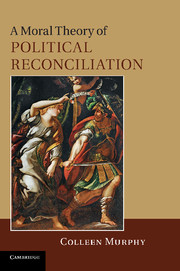4 - Evaluating processes of political reconciliation
Published online by Cambridge University Press: 02 December 2010
Summary
INTRODUCTION
In Chapters 1, 2, and 3 I argued that the frameworks of the rule of law, political trust, and capabilities provide important theoretical resources for understanding how relationships go wrong during civil conflict and repressive rule, as well as how relationships should be rebuilt. Each framework drew attention to the deeper moral issues that are expressed in actions widely regarded as morally problematic during civil conflict and repressive rule. However, for my analysis of political reconciliation to be complete it is necessary to discuss the general question of how transitional societies should foster the desired transformation. In this chapter I concentrate on what it would mean for a putative process to be successful in contributing to the desired transformation of political relationships and pursuing this transformation in a morally permissible manner.
My first objective is to develop a general framework for evaluating whether and in what ways a particular process contributes to the rebuilding and transformation of political relationships. The proposed framework is not a substitute for public policy analysis or political judgment in particular transitional societies; my goal is thus not to outline a general formula for pursuing political reconciliation. Indeed, the determination of which process would be appropriate to pursue in a particular context depends on a detailed understanding of how relationships have gone wrong, what kinds of transformation are the most pressing, and what kinds of damage particular processes are in a position to repair.
- Type
- Chapter
- Information
- A Moral Theory of Political Reconciliation , pp. 123 - 143Publisher: Cambridge University PressPrint publication year: 2010



